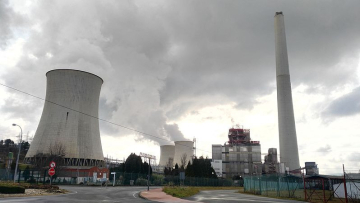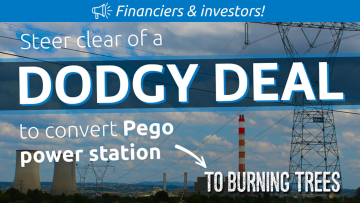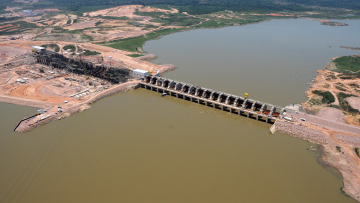
Company – On record
This profile is no longer actively maintained, with the information now possibly out of date
Company – On record
This profile is no longer actively maintained, with the information now possibly out of dateWhy this profile?
ENGIE hasn't provided a comprehensive coal phase-out schedule yet which is not in line with the goals of the Paris Agreement. The company aims to convert its coal-fired plants to fossil gas and biomass. Moreover it is supplying and trading 2.5 million tons of biomass annually. The carbon emissions of burning wood to generate energy carries significant climate, environmental as well as economic risks.
| Sectors | Coal Electric Power Generation , Biomass Electric Power Generation, Hydroelectric Power Generation |
| Headquarters |
|
| Ownership |
listed on Euronext Brussels & Euronext Paris
Engie's complete shareholder structure can be accessed here. |
| Subsidiaries | |
| Website | http://www.engie.com |
ENGIE, founded in 2008 and known as GDF SUEZ until April 2015 engages in the power, natural gas, and energy services businesses. The company operates through France Excluding Infrastructures, France Infrastructures, Rest of Europe, Latin America, USA & Canada, Middle East, Asia, & Africa, and Others segments. It provides energy sales and services for buildings and industry, cities and regions, and infrastructures, as well as to individual and professional customers; and operates natural gas transportation, storage, and distribution networks and facilities, and LNG terminals primarily in France, as well as sells access rights to these terminals.
Impact on climate
ENGIE's targets are classified in the category 2° Celsius according to the Science Based Target iniative (SBTi) accreditation. This means that ENGIE's targets are not compatible with the Paris climate agreement, whose goal is to limit global warming well below 2° Celsius. ENGIE claims it cannot commit to any scheme under a 1.5° Celsius framework, because doing so would require the company to sell off more assets.
Biomass
The planned conversion of coal-fired plants into biomass plants entails further emissions, mainly from the combustion of wood biomass. Wood, for example, in the form of pellets, is the most common form of biomass and, unlike popular belief, is about as harmful to the climate as coal. Global demand for wood pellets for biomass is devastating irreplaceable forest ecosystems. Damaging logging practices such as clear-cutting, and the conversion of natural forests into managed or plantation forests are additionally associated with the trade of biomass. The EU's Joint Research Centre found in this regard that the use of biomass not only leads to higher emissions but also poses a risk to biodiversity and ecosystem health.
Gas
ENGIE's decarbonization plan rests heavily on untrustworthy approaches, like burning fossil gas with carbon capture and storage technology. However, carbon capture infrastructure is known to be unreliable, reportedly prone to leaks and improper storage. Moreover, ENGIE hopes to "green" natural gas by using renewable hydrogen, even though more than 95% of industrial hydrogen is extracted from fossil fuels.
The group also plans to decarbonize using biomethane and synthetic methane. Even if they're not as damaging as conventional fossil gas, these gases, when burned, still create carbon dioxide and impact the climate. Rather than looking for a silver bullet, ENGIE must commit to full decarbonization through renewable energy sources like wind and solar.
Impact on nature and environment
75% of ENGIE's wood pellets are expected to be sourced from Australian suppliers. The remainder of the biomass will be sourced from other suppliers in North America, Canada, and South East Asia. The growing demand for wood pellets is devastating forest ecosystems in these regions through deforestation and land degredation, including clear-cutting and harvesting of whole logs to burn in biomass facilities.
Impact on pandemics
Wood biomass is associated with high rates of deforestation as well as monocultures of various crops. There is a growing body of evidence that shows the connection between deforestation and an increased risk for disease outbreaks and pandemics. For example, monocultures like eucalyptus plantations reduce biodiversity leaving species like rats and mosquitoes, which are more likely to spread dangerous pathogens, to thrive. This biodiversity decline results in a loss of natural disease regulation and poses a risk for human, animal and environmental health.
Engie is financed through share holder capital. It's largest shareholders include: Government of France (23.6%), Capital Group (4.83%), Caisse Des Depots & Consignations (4.61%), Engie Employee Stock Ownership Plan (3.88%), Norges Bank (2.0%), BlackRock (1.43%), BNP Paribas (1.37%), Market Screener dated May 8 2023.
Engie has issued several bonds, which were underwritten by several commercial banks:
- A EUR 650 million, April 2023, underwritten by Barclays, Commerzbank, HSBC, J.P. Morgan, Morgan Stanley, NatWest, RBC, Scotiabank, Standard Chartered, J.P. Morgan;
- A EUR 650 million bond, September 2022, underwritten by BNP Paribas, Crédit Agricole, Société Générale, BBVA, Banco Santander, ING, Mizuho, UniCredit, KBC, Morgan Stanley, MUFG, NatWest, Standard Chartered;
- A EUR 750 million bond, September 2020, underwritten by BNP Paribas, Crédit Agricole, Mizuho, Natixis, Société Générale, UniCredit, Barclays, La Banque Postale, NatWest (see below for more details);
- A EUR 1 billion bond, March 2020, underwritten by 16 commercial banks (see below for details on banks involved).
A complete overview of Engie's outstanding bonds can be accessed here.



